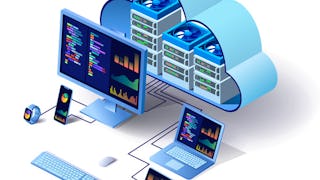This course will guide you through fundamental concepts and skills to confidently navigate various aspects of IT and the digital world. You will be introduced to the vast field of IT, covering a wide range of topics to build your IT knowledge. You will delve into hardware, operating systems technology, software, programming, databases, networking, storage, cybersecurity, cloud computing, and support and operations.

Enjoy unlimited growth with a year of Coursera Plus for $199 (regularly $399). Save now.

Information Technology (IT) Fundamentals for Everyone
This course is part of multiple programs.

Instructor: IBM Skills Network Team
30,248 already enrolled
Included with
(269 reviews)
Recommended experience
What you'll learn
Define operating systems, computer components, programming concepts, databases, and explain the differences between commercial and open software
Summarize the importance of computer networks, including wired and wireless connections; explore network resources and storage types in MS Windows
Describe how to protect against security threats, address public browsing security concerns, and list password management best practices
List the benefits of cloud computing, describe the cloud infrastructure layer, virtual machines, and summarize features of ticketing systems
Skills you'll gain
- Network Troubleshooting
- Technical Support and Services
- Project Management
- Database Software
- Virtual Private Networks (VPN)
- Computer Security Awareness Training
- Cloud Infrastructure
- Software Installation
- Cloud Computing
- Computer Programming
- Computer Networking
- Operating Systems
- Information Technology
- Data Storage
- Cybersecurity
- Computer Hardware
- Hardware Troubleshooting
Details to know

Add to your LinkedIn profile
18 assignments
See how employees at top companies are mastering in-demand skills

Build your subject-matter expertise
- Learn new concepts from industry experts
- Gain a foundational understanding of a subject or tool
- Develop job-relevant skills with hands-on projects
- Earn a shareable career certificate from IBM

There are 6 modules in this course
This week you will learn about computer hardware and operating systems. Lesson one presents computing fundamentals such as types of devices, their benefits, their internal components, and peripheral devices. Other hardware you will learn about includes printers, display devices, and port types, along with their connectors. In lesson two, you will be introduced to operating systems for the devices you learned about in lesson one. You will learn how those operating systems implement files and folders and the basic operations you can perform on them.
What's included
11 videos3 readings3 assignments1 app item5 plugins
This module has three lessons that cover the basics of software, web browsers, programming languages, and database fundamentals. The first lesson addresses software applications, where you learn about the differences between open-source and commercial software, software versioning, file formats, and components of web browsers. In the second lesson, you will explore some basic programming concepts. In the third lesson, you investigate databases, where you compare and contrast different types of database storage and manipulation.
What's included
12 videos3 readings4 assignments2 app items6 plugins
In this two-lesson module, you learn about networking and storage. Lesson one focuses on networking, where you investigate concepts such as comparing and contrasting types of networks’ topologies, the cables used to connect devices to a network, and the common ports those cables use. You learn about network connections and how to adjust network settings in Windows. In lesson two, you are presented with types of local storage devices compared to hosted storage and sharing and how to troubleshoot storage issues.
What's included
10 videos2 readings3 assignments2 app items3 plugins
In the two instructional lessons in this module, you will be introduced to some fundamental concepts in cybersecurity. First, you hear about the confidentiality, integrity, and availability triad and then about intellectual property and confidential information. Then you will learn about types of threats, breaches, and attacks. You will explore password management, access control, authorization, and single-sign-on authentication. In lesson two, you will learn about safe browsing practices such as application ecosystem security, plug-ins, extensions, and toolbars. You will also learn about public browsing risks, safe browsing techniques, and virtual private networks.
What's included
11 videos2 readings3 assignments1 app item5 plugins
Cloud computing is the topic of this module. In lesson one, explore the characteristics, benefits, models, infrastructure, virtualization, and storage for cloud-native applications. In lesson two, you learn about cloud-computing emerging trends and practices. Some of those trends include the hybrid-multi-cloud, containerization, microservices architecture, serverless computing, and the development of applications specifically for the cloud, also known as cloud-native applications.
What's included
12 videos2 readings3 assignments1 app item5 plugins
In the first lesson of this module, you will test your knowledge and the skills you’ve acquired in this course. This module contains a 20-question graded final examination focused on the content of this course. In lesson two, you may choose to learn about troubleshooting and ticketing systems. This is not a required lesson for this course, but the content will provide you with an overview of troubleshooting and ticketing systems, enhancing your knowledge of IT Fundamental concepts.
What's included
5 videos3 readings2 assignments2 plugins
Earn a career certificate
Add this credential to your LinkedIn profile, resume, or CV. Share it on social media and in your performance review.
Instructor

Offered by
Explore more from Computer Security and Networks
 Status: Free Trial
Status: Free TrialIllinois Tech
 Status: Free Trial
Status: Free Trial Status: Free Trial
Status: Free Trial Status: Free Trial
Status: Free Trial
Why people choose Coursera for their career




Learner reviews
269 reviews
- 5 stars
80.81%
- 4 stars
12.54%
- 3 stars
1.47%
- 2 stars
2.58%
- 1 star
2.58%
Showing 3 of 269
Reviewed on Apr 3, 2024
The lessons can sometimes be boring and some contents don't have subtitles in English. Include visualization and metaphors in your lessons so it's easy to understand.
Reviewed on Mar 2, 2024
This course is a great place to start learning about IT.
Reviewed on Aug 23, 2023
It's a pleasure to take this training course. Very understanding and helpful.RegardsIbrahim M. Yahaya
Frequently asked questions
To access the course materials, assignments and to earn a Certificate, you will need to purchase the Certificate experience when you enroll in a course. You can try a Free Trial instead, or apply for Financial Aid. The course may offer 'Full Course, No Certificate' instead. This option lets you see all course materials, submit required assessments, and get a final grade. This also means that you will not be able to purchase a Certificate experience.
When you enroll in the course, you get access to all of the courses in the Certificate, and you earn a certificate when you complete the work. Your electronic Certificate will be added to your Accomplishments page - from there, you can print your Certificate or add it to your LinkedIn profile.
More questions
Financial aid available,





